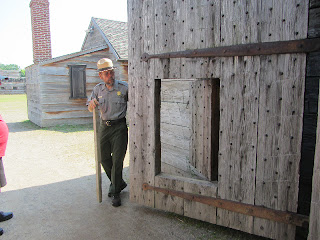THURSDAY, JUNE 21, 2012
Yesterday when we got to Rome we talked to
the boaters in front of us who had just gotten back from visiting Fort
Stanwix. They said it was well worth
the walk. I needed the rest of the
day after we arrived to recuperate from the walking at Niagara Falls (I am so
glad we went. We’ll never see such
power again.). We decided to go
this morning before we left for Sylvan Beach. It was a very good decision.
We first walked almost a mile to the fort. We were early since we weren't sure how long it would take us to get there. We ended up on the side away from the museum so we took a few pictures as we walked around the fort.
Then we continued to walk around the path to the museum to look around inside before the 10:00 a.m. tour. Inside we were greeted by Ranger Dan. We walked around the lobby and then Dan decided to give us the orientation regarding the area. I am not going to tell you everything he said even if I could remember it all. If you look closely at the wall on the right in the picture where he is walking across the floor you can see the map that he used to give his talk. He used a laser since the map is so tall. Their website says, "For centuries, the Oneida Carrying Place, a six mile portage connecting the Mohawk River and Wood Creek, served as a vital link for those traveling by water from the ocean to the Great Lakes. When Europeans arrived, nations fought for control of the carry, the homelands of the Six Nations Confederacy, and the rich resources of North America. In this struggle, Fort Stanwix would play a vital role. " Portage refers to the practice of carrying watercraft or
cargo over land to avoid river obstacles, or between two bodies of water. It was very important, because whoever controls the portage, controls the area.
The museum told tales of the time from the perspective of four people from the area. You can read about them if you enlarge the picture.
There were movies to show you about he siege of Fort Stanwix and General Herkimer in the Battle of Oriskiny in August of 1777. There were also exhibits to help understand life during that era. The glass had reflections in it so the pictures are not as clear as usual.
Dan showed us the large gates just inside the drawbridge. The right one has a wicket door in it. It is a small door or gate inside a larger one. This was an easy way to enter or exit the fort if the large gates were closed. After that Dan told us a little bit about what we would see and let us continue at our own pace.
First Gary and I visited the bunk room, where a private showed us the barracks and told us about how life in the fort would be for him. The brochure says that the long straw-filled beds called "cribs" slept 10-12 men side by side.
Then Gary and I visited the sutler's shop. It was like a trading post in the fort. A ranger who was supposed to be Mary Jemison told us about her store. Mary was kidnapped by the Shawnee and then adopted by the Seneca. She chose to remain with her Seneca family. She lived to be 90 years old.
We looked at some of the rooms but couldn't go in. They were the commandant's quarters,
the staff room/dining room,
the missionary's quarters,
and the family quarters.
When we were walking in and out of some of the rooms, what amazed me was the width of the thresholds. I stood on one of them so you could see how wide they are. My shoes are almost 12 inches long and my heels aren't quite to the back edge.
There was an original fireplace behind glass.
6-pound cannons (This cannonball weighs 6 pounds. It was extremely heavy. You know it's strapped to the board so it won't roll off a flat surface onto my toe. The 6-pound cannon was the one they fired.),
and 9-pound cannons. The number tells how heavy the cannonball is.
By that time we were tired and thirsty. We did take a few pictures when we were leaving.
We saw a huge painting of a horseman on the entire side of a building when we were walking back. If I had a guess, I would guess it was General Herkimer. He is very well-known around here.
Finally the boat is in sight. It was a long morning, but we enjoyed the visit to Fort Stanwix.














































That looks like it was fun! The pictures were great, as usual.
ReplyDelete